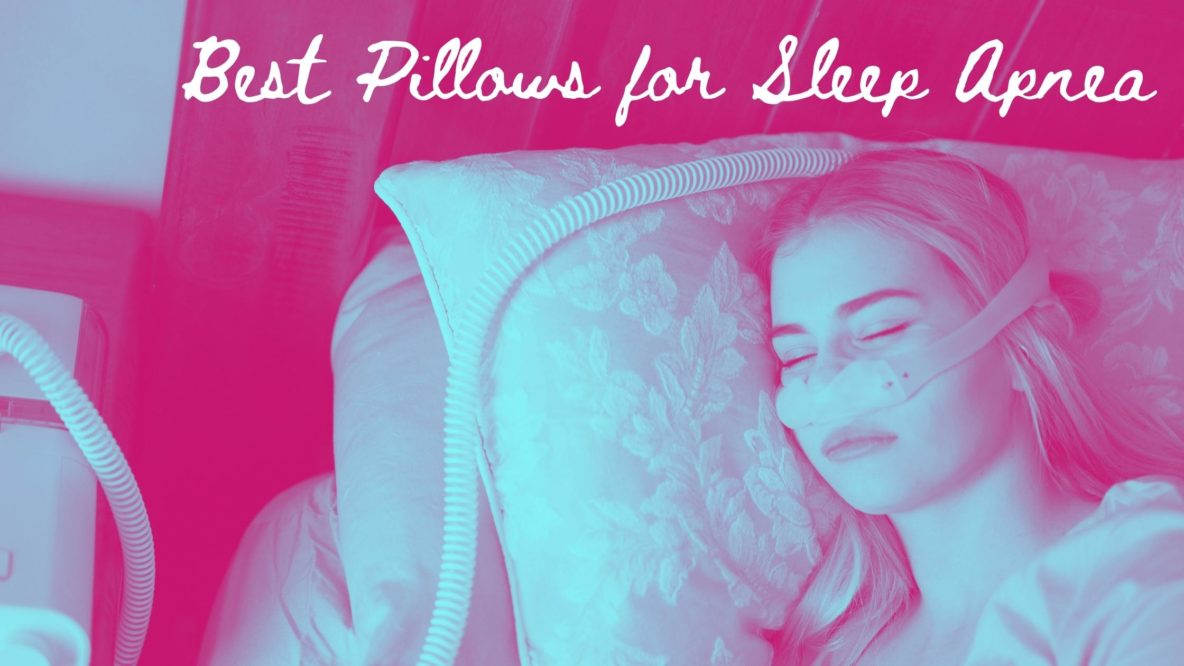Best Pillows for Sleep Apnea

- A Promising Paradigm Shift: New Research Challenges the CPAP-First Approach to OSA Treatment - September 5, 2023
- Understanding Sleep Meditation Techniques - July 30, 2021
- How Online Learning Has Affected Sleep for Students - July 13, 2021
Sleep apnea can make it difficult to get a good night’s sleep. You wake up repeatedly throughout the night, and can’t seem to get quality sleep. Along with good sleep hygiene, the right pillow can go a long way in helping you manage the symptoms of sleep apnea and enjoy a restful sleep.
Can A Pillow Really Make a Difference?
If you have sleep apnea, you’re used to waking up gasping for your next breath, or starting the day with a morning headache or dry mouth. You’re no stranger to daytime drowsiness, fatigue, and increased irritability.
Along with a Continuous Positive Airway Pressure (CPAP) machine, a supportive pillow can help you get the sleep you need. Pillows really can make all the difference. The right pillow can improve your comfort at night while also supporting your head and neck to keep your airway open and make breathing easier.
Ergonomic Design
The perfect pillow is different for everyone, but the key is finding a pillow with an ergonomic design. This pillow will comfortably support your head, neck, and shoulders, allowing your muscles to relax. However, this pillow will also keep your head and your neck in alignment so that when you relax your airway stays open.
The right pillow for you will depend on your sleeping position, body type, and personal comfort. If you sleep on your back, you may need less support to keep your spine aligned. If you sleep on your side, you will need additional neck and shoulder support to keep your neck in alignment. You can look for a pillow with additional shoulder cushioning or even a wedge.
Wedge pillows are higher on one side. They can raise your body and reduce symptoms such as snoring and acid reflux.
Do you use a CPAP machine? Some pillows have cutouts that can support your CPAP machine and keep it in place during the night. These pillows will make it more comfortable to wear your CPAP mask during the night. The cutouts will support your CPAP machine during the night, as well as keeping the mask from pressing into your face or nose when you move.
Pillow Height
Everyone has a different ideal pillow height. Before buying a pillow consider:
- Sleep position: If you sleep on your side, you need a higher pillow. If you sleep on your stomach, you may prefer a lower pillow.
- Body shape: If you have broad shoulders, you’ll need a higher pillow. This gives you optimal support during the night. If you have narrow shoulders, choose a lower pillow.
- Sleep apnea symptoms: Do you experience acid reflux, or snore loudly? A higher pillow can realign your neck, and minimize these symptoms.
You might also consider some additional supports such as raised side bolsters to keep you from rolling over in the night, or even a pillow with different heights if you sleep in several positions throughout the night.
Choosing the Right Material
Pillows come in all shapes, sizes, and materials. We recommend finding a pillow that’s not too hard and not too soft.
Hard pillows can be uncomfortable, and lead to sore neck or shoulder muscles. It can also place pressure on your head and put your neck in an uncomfortable position. Pillows that are too soft do not provide adequate support, and you’re more likely to snore or experience sleep apnea during the night.
Memory foam can be an ideal material. It’s not too hard or soft, and it will shape itself to match your sleeping position. It can also relieve pressure on your shoulders and spine during the night. However, memory foam is not a breathable material, and you may experience night sweats.
Sound Sleep Medical
Do you need some tips on choosing the best pillow for sleep apnea? The right pillow can help position your head, neck, and shoulders for comfortable sleep and an open airway. It can also improve your nighttime breathing, and reduce the symptoms of sleep apnea. The best pillow for you can also prevent movement during the night, making it easier to use a CPAP machine when you sleep.
Visit Sound Sleep Medical for personalized help in choosing the right pillow to manage your symptoms, and learn more about sleep hygiene for sleep apnea.
